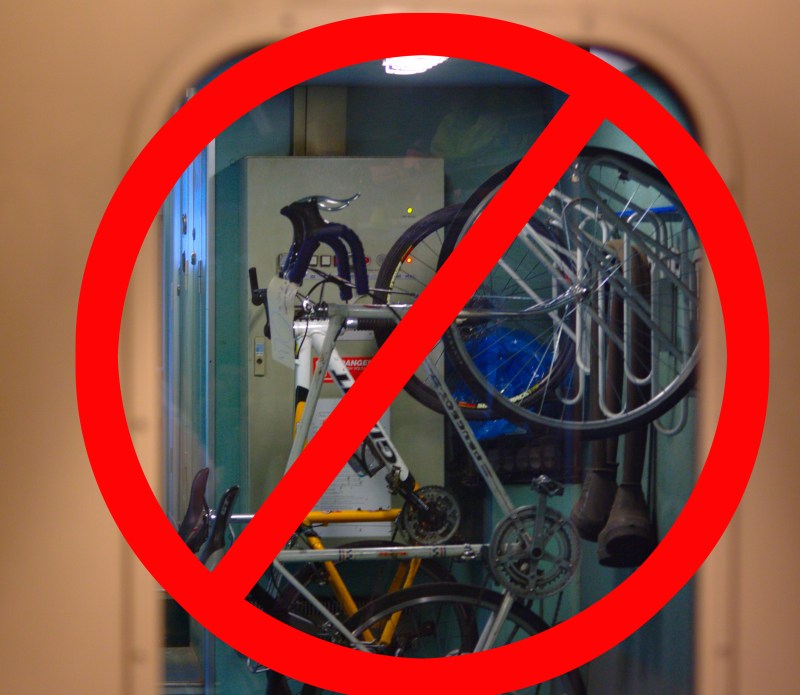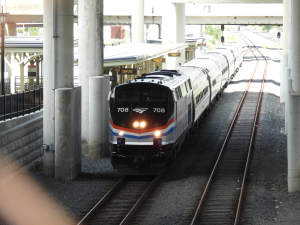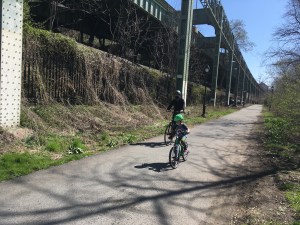Amtrak Abruptly Stops Bike Service on ‘Maple Leaf’ to Upstate and Canada

The Maple Leaf has fallen!
Cyclists lost a crucial train route for getting their wheels to the scenic upstate Empire State Trail after Amtrak quietly ended bike service on its New York-to-Toronto line this month.
The Maple Leaf, which runs daily with stops in hard-to-get-to upstate destinations such as Utica, Rome, Rochester, Syracuse and Niagara Falls, abruptly cancelled bike service on July 1, leaving riders who had already booked scrambling, the Albany Times-Union reported. Amtrak said it cancelled bike service because it doesn’t have room for bike racks.

Amtrak’s Empire Service, which runs between New York and Niagara Falls via Albany and Buffalo, also takes city residents to the western spur of the Empire State Trail. And the Ethan Allen Express between New York and Rutland, Vt. via Albany, gets passengers to the power part of the northern spur of the trail. But those trains have limited bike capacity.
As a result of the demise of the Maple Leaf bike service, cyclists have many fewer biking spots.
The move rankled New York-based bike activists, who said that it was symptomatic of the obtuse, anti-bike attitude of many American transportation planners.
“Combining bikes and transit is the bread and butter of sustainable transportation the world over,” said Bike New York’s Jon Orcutt. “Why can’t American providers and planners finally get it into their goddamn heads?”
The cancellation also exercised the chairman of the Sen. Tim Kennedy (D-Buffalo), the chairman of the state Senate Transportation Committee who “strongly” urged Amtrak to reverse the decision and “to expand, rather than contract, Amtrak’s bicycle services.”
As New York continues to invest in sustainable infrastructure, this latest update from @Amtrak is an unexpected blow to cyclists statewide.
As Chair of the Senate Transportation Committee, I’m urging Amtrak to immediately reverse this decision and expand – not cut – services. https://t.co/XTpgXbbRjP pic.twitter.com/tPERqmvDDn
— Senator Tim Kennedy (@SenKennedy) July 12, 2022
Kennedy said the removal of the service amid the summer tourist season would hurt bicycle tourism and many small business along the Empire State Trail just as they were hoping to recover from the pandemic. The 750-mile, bike-walking trail, launched in 2017, runs from New York City to Albany along the Hudson River, then west along the Erie Canal to Buffalo. The bike trail and the Maple Leaf route are adjacent from Albany to Rochester, and many cyclists take the train to Syracuse or Buffalo in order to pick up the trail and then ride back to Albany.
Now, they must use “expensive shuttle services” or rent cars just as the nation is experiencing a rental-car shortage, Kennedy wrote.
It’s “an unexpected blow to cyclists statewide,” he tweeted.
The loss of a line to the Empire State Trail also represents a setback for New York City cyclists, apart from any inconvenience and extra costs the cancellation might impose. Even as the state spent $750 million improving the trail several years ago, it paid little attention to the trail connections here.
Andres Salomon, a Queens-based cyclist who has taken his bike on train trips upstate, said, “Well, I’m relieved it’s just that route, but that’s still disappointing that they’d do that. A decade ago it was an incredible headache to deal with Amtrak and bikes …. Amtrak’s made so much progress since then; I don’t want to see progress rolled back.”
Amtrak justified the Maple Leaf bike-service cancellation as necessary for the comfort of passengers.
“The very long ride on the Maple Leaf makes it important to have different trains on the route [with] additional legroom and restroom capacity, and other features making it conducive for a longer trip,” explained Amtrak spokesman Jason Abrams. The Maple Leaf takes roughly 12 hours to get to Toronto.
Abrams called the change in equipment “temporary,” but said that there was no information on when bike service might return, adding that “other trains and services are unaffected.” (On another note, Amtrak has still not restored New York-to-Montreal service on its Adirondack line.)
The fee for bringing a bike onboard is $20. But it pays to know what you’re allowed to bring.
According to the Amtrak website: “Full-size bicycles may be carried on certain trains with designated walk-on bicycle service. Folding bicycles that meet specific size and weight limits may be brought onboard instead of a carry-on bag. Bicycles and bicycle trailers may also be checked for a fee. Recumbent, tandem and special bicycles that are over the standard bicycle dimensions and will not fit in a standard bicycle box are prohibited.”


